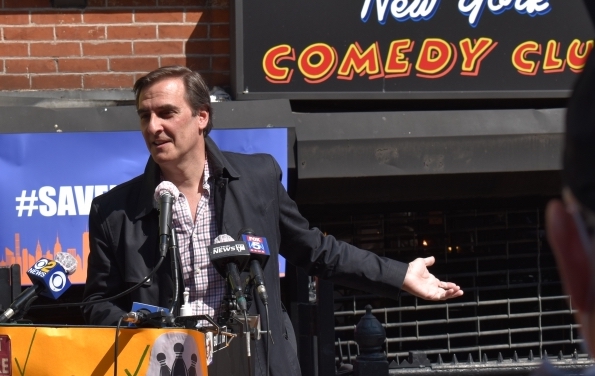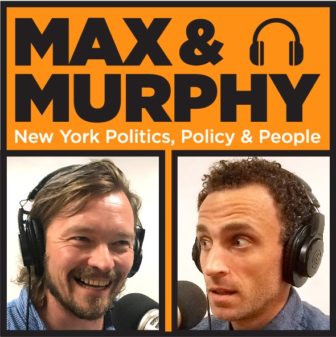A Senate leader says talks are underway about whether to tax the rich to avoid cuts. But how deep the hole will be, and whether the federal government will step in to help fill it, are big unknowns.

NYS Senate
State Senate Deputy Majority Leader Michael Gianaris at a recent event arguing for the reopening of the city’s comedy clubs.New York State and city policymakers are in a holding pattern, waiting to see if the 2020 elections trigger federal aid in time to stave off deep cuts or new taxes, a top state Democrat told the Max & Murphy Show on Wednesday.
Sen. Michael Gianaris of Queens, the deputy Democratic leader in the legislature’s upper house, said a Senate working group is examining new revenue-generating mechanisms to stave off devastating cuts, with the full body ready to reconvene quickly if the state’s budget picture worsens enough that cuts go from threats to reality. Movement forward with any new policy would require Assembly agreement and , likely, the assent of the governor.
“The deficit is incredibly large both at the state and city level and the moment that the cash flow becomes enough of a problem that deep cuts start to get implemented as opposed to just deferred, I think that will necessitate action on our part,” Gianaris said.
“I have long had the position that generating revenue is much less harmful to the state, to the overall economy, than deep cuts to important services,” he said. “If we have schools that are not functioning or hospitals that are not providing care or a sanitation system that’s not working, that will do much more damage to our recovery than asking those who have a lot of money to give a little more so we can provide those services and I think any concerns about people leaving the state over that are not supported by the data.” Gianaris said that Gov. Cuomo, who has in the past resisted the idea of a new millionaire’s tax, has sounded more open to it of late.
The question of what policy to implement if a true fiscal emergency hits is just one part of the equation. Another is how drastic that policy will need to be. And Gianaris says it is too early to tell.
“There’s a question of the scope of the problem,” he says. “It’s important to know the scope of the problem, and the scope will be determined ultimately by the federal government.” The federal picture could change dramatically if President Trump loses and the Senate goes blue.
The possibility of a changed federal posture also looms large in the question of whether to extend borrowing powers to the city to cover operating budget shortfalls, Gianaris said. The city’s current request for $5 billion in authority over two years, he said, covers too long a period of time—especially when the world could be very different come November 4 or January 20.
Hear the conversation below or listen to the full show, which includes a conversation with education reporter Reema Amin about the shaky restart of public schools.









